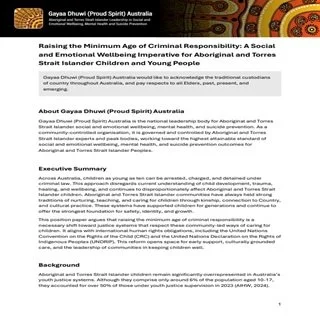Position Paper. Raising the minimum age of criminal responsibility.
By Gayaa Dhuwi (Proud Spirit) Australia
Across Australia, children as young as ten can be arrested, charged and detained under criminal law. This approach disregards current understanding of child development, trauma, healing and wellbeing, and continues to disproportionately affect Aboriginal and Torres Strait Islander children. This position paper argues that raising the minimum age of criminal responsibility is a necessary shift toward justice systems that respect community-led ways of caring for children. Social and emotional wellbeing is defined not just by individual mental health, but by a child’s connection to family, community, culture, spirituality and Country. When these connections are disrupted, and when services respond with punishment instead of care, these children are pulled further from what keeps them grounded and well. Raising the age of criminal responsibility is one action that helps shift systems back toward connection, community and support. Despite a growing national consensus that the minimum age of criminal responsibility should be raised, implementation has been inconsistent and slow. The continued criminalization of 10- to 13-year-olds in most jurisdictions is in direct contradiction to the commitments made under the National Agreement on Closing the Gap.
Recommendations
All jurisdictions raise the minimum age of criminal responsibility to 14 years, without exception.
Children under 14 no longer be subject to detention or prosecution, and instead be offered culturally safe, community-led responses.
Governments invest in Aboriginal and Torres Strait Islander-led social and emotional wellbeing programs and initiatives for children.
All reforms have Aboriginal and Torres Strait Islander governance mechanisms and are co-designed with Aboriginal and Torres Strait Islander communities, including children, families and Elders.
A nationally consistent approach be implemented, to ensure fairness across jurisdictions.
Governments improve data transparency and collection, particularly relating to social and emotional wellbeing, disability and diversion outcomes.
All reforms reflect Australia’s human rights obligations under the United Nations Convention on the Rights of the Child (CRC) and the United Nations Declaration on the Rights of Indigenous Peoples (UNDRIP).
Turner, AUS: Gayaa Dhuwi (Proud Spirit) Australia, 2025. 9p


